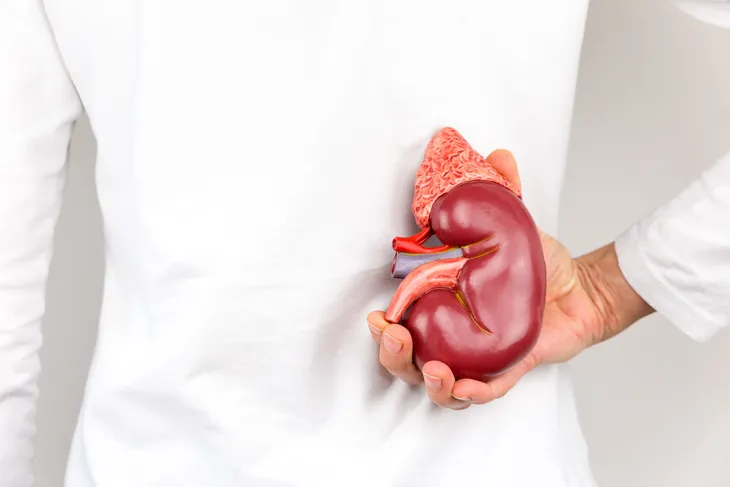Many people live with chronic kidney disease (CKD), and on the verge of kidney failure, without even realizing there is an issue. The gradual transition from unhealthy kidneys to CKD and finally to kidney failure is very subtle with very few symptoms in the early stages.
However, recognizing the symptoms of impending kidney failure can save you years of health problems. Here are the 15 most common signs of kidney failure…
Think you may have a kidney problem? Try Stone Breaker Natural Kidney Cleanse & Gallbladder Formula – an Amazon 4.5+ star best-seller with over 1,700 consumer ratings. (As an Amazon associate, this site earns from qualifying purchases).
1. Leg & Back Pain
The most typical sign of CKD is lingering pain in the legs and the lower back, close to where the kidneys are situated. You’ll often just feel pain in the side of the affected kidney. The discomfort can be so terrible that it’s been compared to labor pain by affected women. This pain and pressure is often due to the kidneys inability to excrete excess fluid from your body, which leads to swelling in the hands, ankles, legs, feet, and face.
The location of the affected kidneys can also be a source of pain. The kidneys are situated on either side of the body, directly underneath the diaphragm, and near the lower back, which is why pain can radiate to the lower back, flank, or even down into the legs. If the kidneys develop cysts due to polycystic kidney disease, this can understandably result in leg and lower back pain as well.
2. Urinary Urgency
The kidneys produce urine in order to filter waste out of the body. This means, oftentimes, when the kidneys are jeopardized, urinary urgency may occur frequently in the middle of the night, and you may notice that you have to urinate more often, with increased pressure, and in larger quantities. The pressure may be so strong on your bladder that you feel you can’t squeeze all of the urine out when you go to the bathroom (similar to a urinary tract infection). If the urine contains blood, you should see a doctor immediately.
In addition to frequency and increased amounts of urine, trouble with the kidneys can also be indicated by a change in the color of urine. For instance, frequency of urination (greater amounts day and night) can change along with urine color, or appearance (urine may be foamy or bubbly) and ease (you can develop difficulty urinating).
3. Fatigue
Healthy kidneys produce adequate amounts of erythropoietin (EPO), a hormone that increases the production of oxygen-carrying red blood cells. Without adequate EPO, your body and brain will fatigue often (as they are receiving less oxygen) and you’ll require more sleep than usual.
Those with kidney issues will often notice an unexplained decrease in energy (not from physical exertion or dietary reasons). This can clue you into a problem with kidney function. At the point of kidney failure, a kidney transplant or dialysis (filtering of blood) may be necessary for life.
4. Swelling
As kidneys fail, they slow the process of fluid elimination from the body. Therefore, this excess fluid pools in your extremities, resulting in swollen legs, hands, ankles, and feet—so much so that you often can’t get shoes or rings on. Doctors refer to swelling in the body as edema. It’s characterized by leaky small blood vessels, which release fluid into nearby tissues. This accumulation of excess fluid causes the tissues to swell.
According to the National Kidney Center, swelling from impaired kidney function typically occurs in the face, hands, feet, legs, and ankles when the kidneys are unable to eliminate excess fluid from the body. Edema that results in the legs and sometimes the entire body due to kidney disease is called “nephrotic syndrome” by doctors.
5. Irritated Skin
Skin irritation, such as acne breakouts and itchy rashes, occur due to the excess waste floating around in your body. Healthy kidneys will usually eliminate excess fluids, waste, and toxins from the body via the urine. All urine contains the byproducts of metabolism, including (obviously) water, salts, and toxins, that if left in the body end up in the bloodstream. Without healthy, functioning kidneys, waste products and toxins would soon build up to dangerous levels.
Unhealthy kidneys, or kidneys in failure, are unable to flush waste out of the body via urine as effectively, which may cause signs of excess toxicity on the skin. As a result of excess waste and toxins circuiting in your bloodstream, the buildup may start to emerge on the surface of your skin, taking the form of acne, rashes, dry skin, irritated red skin, hives, and severely itchy skin.
6. Nausea
Toxicity (or the increase of wastes that can’t be eliminated via urination) will often result in a general feeling of nausea as well as a lack of appetite and weight loss. In severe cases, vomiting will make it difficult to keep food and nourishment down. Any damage to the kidneys can cause decreased urination when wastes build up in the bloodstream and are unable to be eliminated efficiently.
In addition to causing nausea and vomiting, kidneys that don’t function properly or at all will lead to a buildup of waste that results in other obvious symptoms. For instance, a buildup of waste can lead to bad breath, appetite loss (everything tastes bad), and a metallic ever present taste in the mouth (also impacting taste). You may suffer weight loss as a result.
7. Metallic Flavor
Patients whose kidneys fail will often describe a metallic taste (also called ammonia breath) that lingers in the mouth in the weeks and months prior to actual kidney failure. This metallic flavor is due to uremia (excess waste byproducts present in the bloodstream). Doctors use exhaled breath to monitor patients for a number of conditions, and kidney failure is one. Exhaled breath contains over a thousand compounds, such as carbon dioxide, nitrogen, water, inert gases, trace components, and oxygen.
Ammonia levels in the body (plus ammonium ions) are converted to urea in the liver of healthy individuals, transported through the bloodstream, and eventually excreted into urine by the kidneys. This is why the presence of “ammonia breath” is often used by doctors to determine kidney impairment. The detection of metallic flavors in the mouth may prompt doctors to test exhaled breath for the presence of ammonia.
8. Anemia
Those with partial to full kidneys failure can develop anemia (a deficiency of red blood cells or hemoglobin in the blood) at almost any stage of CKD and you will experience tired muscles, weakness, and overall fatigue.
However, anemia will worsen as CKD progresses. Those with complete loss of kidney function almost always have anemia.
9. Confusion
Due to the lack of oxygen-carrying red blood cells in the body, individuals suffering from anemia due to kidney failure will often feel confused or become fairly forgetful.
This is because for the brain to function efficiently, it needs oxygen. So if the brain isn’t getting the oxygen it needs to perform at its best, patients may feel a little confused and have troubles thinking clearly.
10. Shortness of Breath
Shortness of breath is symptom that could be caused by a few factors for kidney disease. Firstly, due to the increased amount of fluid build up in the body, this liquid could potentially build up around the lungs, causing individuals to suffer from shortness of breath due to the pressure and tension surrounding the lungs.
Secondly, as anemia develops, shortness of breath may be caused by the shortage of oxygen-carrying red blood cells and the lack of oxygen in the body.
11. High Blood Potassium
The kidneys are responsible for balancing potassium (through food and fluids) by excreting it in the urine. However, if they become damaged or fail, this function is disrupted, leading to elevated levels of potassium in the blood. This condition is known medically as hyperkalemia.
While potassium is essential to the functioning of the nerves and muscles, too much of it can lead to a variety of health problems. Hyperkalemia can lead to potentially fatal disturbances or irregularities in the rhythm of the heart, also commonly referred to as arrhythmias.
12. Seizures or Coma
As mentioned earlier, kidney failure can cause cognitive issues such as confusion and forgetfulness to occur. Additionally, people with this condition may also experience other impairments, including anxiety, trouble concentrating, and brain fog.
While these issues may occur due to a lack of oxygen in the brain, they can also result from a build up of toxins in the body that the damaged kidneys are unable to filter out. If this build up becomes extreme, it can lead to seizures or, in extreme cases, even coma. Although these symptoms are more rare, if they do occur, you should seek medical attention immediately.
13. Sleep Disturbances
Another common issue that can occur with kidney failure is sleep disturbances. This may include having trouble falling asleep and staying asleep. As with the other brain-related impairments previously mentioned, sleep issues are often caused by an excess of toxins building up in the blood.
But because a person’s sleep can be affected by a vast variety of factors, including emotions, stress, and dietary choices, they do not often suspect that the cause is impaired kidney function or failure. As such, it’s important to be mindful if these sleep issues occur in conjunction with other symptoms mentioned on this list.
14. Excessive Thirst
People who are suffering from kidney failure may also find that they are excessively thirsty. As with sleep disturbances, people often dismiss this symptom as it can be caused by any number of factors, including intense exercise, digestive issues like diarrhea, or from simply eating spicy or salty foods.
But oftentimes, those with kidney problems experience unquenchable thirst because the body is attempting to combat the loss of fluids that occurs as a result of frequent urination. In order to prevent dehydration, it prompts you to drink large quantities of water. Unfortunately, this can become a frustrating cycle, as the increased fluid intake will then lead to a need to urinate even more often.
15. Sexual Problems
Symptoms of kidney failure can also extend to sexual problems in both men and women. In men, impaired kidney function can cause a decreased sex drive, as well as impotence, which the National Kidney Federation says may be due to low testosterone or anemia. In some cases, kidney diseases can also affect male fertility, but this is more rare.
Loss of sex drive can also affect women with kidney failure. As with men, this is often due to a hormone imbalance or anemia. Women may also experience irregular or absent menstrual cycles, although the source says that this does not necessarily indicate issues with fertility.


















